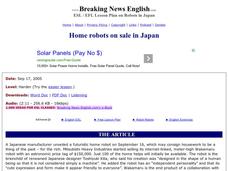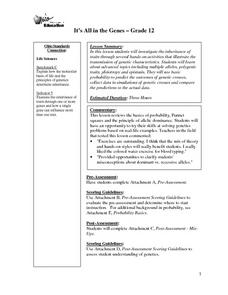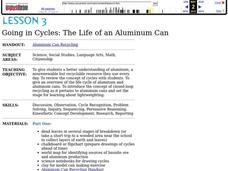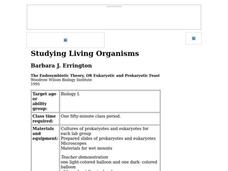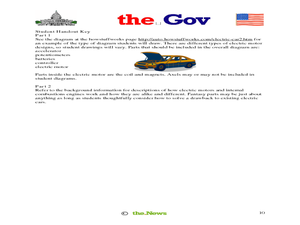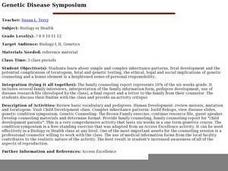Curated OER
Breaking News English: Robots in Japan
In this Robots in Japan worksheet, students read the article, answer true and false questions, complete synonym matching, complete phrase matching, complete a gap fill, answer short answer questions, answer discussion questions, write,...
Curated OER
Build a Polyp
Young scholars research coral polyps. In this coral polyps lesson, students discover the anatomy of a coral polyp and how they feed. Young scholars create an edible coral polyp model.
Curated OER
What is an Ahupua'a?
Students research ahupua'a ecosystems. For this ahupua'a lesson, students explore how land is subdivided in Hawaii and the effect on the ecosystem. Resources are provided.
Curated OER
Senses of Taste and Smell
Students perform experiments to learn about their sense of taste and smell. In this taste and smell lesson, students watch as a blindfolded student tries to identify sounds and the direction they originate from. Students observe a...
Curated OER
Water/Agua
Third graders complete water activities including vocabulary, visualization and performing activities. They study water vocabulary words in both English and Spanish. They listen to a read aloud of Jane Yolen's, Letting Swift River Go,...
Curated OER
Chemquest: Physical Changes or Chemical Reactions
Students study the differences between physical and chemical changes. In this chemical reactions lesson students participate in an indoor and outdoor lab activity.
Curated OER
Heat Up the Floating Plates
Eighth graders research the connection between the convection currents within the mantle of the earth and the moving of Earth's plates. A connection to lessons at previous grade levels on the rock cycle and important background...
Curated OER
Birds: Wetlands Ecosystems
In this birds worksheet, students click on the links to learn about the birds of the Wetlands and answer short answer questions about it. Students complete 7 questions total.
Curated OER
Children's Literature Across the Curriculum Ideas-Ira Sleeps Over
Students read Ira Sleeps Over by Bernard Waber. They complete a variety of cross-curricular activities surrounding the ideas presented in the story. Included are reading, art, math, science, writing, social studies, and library...
Curated OER
Hardy-Weinberg Equilibrium According to Hoyle:
Students gain a feeling for the significance of the Hardy-Weinberg Equilibrium without using algebra but participating in an interactice game.
Curated OER
The Power of the Environment in Our Lives
Young scholars participate in a series of activities designed to demonstrate the differences between symbiotic and parasitic relationships. They discuss the differences and catergorize man's relationship with nature.
Curated OER
It's All in the Genes
Twelfth graders investigate the inheritance of traits through several hands-on activities that illustrate the transmission of genetic characteristics. Students study advanced topics including multiple alleles, polygenic traits,...
Curated OER
Scientific Method
Students explore the scientific method. In this scientific method lesson, students use information gathered from a "Seed Dispersal" lab done previously to complete a worksheet listing the steps of the scientific method.
Curated OER
Going in Cycles: The Life of an Aluminum Can
Students investigate the manufacture of aluminum cans and consider the energy and resources saved when the cans are made from recycled material. They explore the concept of closed-loop recycling using charts, worksheets and discussion.
Curated OER
Going in Cycles: The Life of an Aluminum Can
Students explore the life cycle of aluminum cans. In this recycling instructional activity, students review the manufacturing process and how to make a closed loop cycle. Students also have the opportunity to present what they've...
Curated OER
Description of Materials for Parts of a Fossil Lesson Plan
Students study fossils. In this fossils lesson plan, students discuss and study real fossils. Students color in pictures of fossils and their sections. Students then identify fossil picture parts and names. Students write definitions for...
Curated OER
Land Use Issues
Learners observe and describe the properties of rocks and their significance relationship in the environment. They explain the implications of destroying habitats and the importance of rebuilding them.
Curated OER
Studying Living Organisms
Students are introduced to Hardy-Weinberg Equilibrium without recourse to algebra. After participating in this activity, students gain a feeling for the significance of the Hardy-Weinberg Equilibrium without using algebra.
Curated OER
Plate and Planet
Students investigate the health hazards of modern agriculture and how we can choose better food options. In this healthy eating lesson, students identify different indigenous people in photographs and discuss what they might eat....
Curated OER
Exploring Magnification and the Micro-world
Students examine what magnification is and does. In this microscope and magnification instructional activity, students listen to a reading of Greg's Microscope by Millicent E. Selson which explains what a microscope does. They talk about...
Curated OER
Dendrology
Students work as a class-size unit as well as in small groups to become proficient in observing tree characteristics to facilitate species identification. They identify most common tree species by observing leaf, flower, fruit and bark...
Curated OER
Electric Car: American Industry and Innovation
Students study how an electric car operates. In this electric car activity students assemble an electric car motor from parts from an internal combustion engine.
Curated OER
Genetic Disease Symposium
Students research simple and complex inheritance patterns, fetal development and the potential complications of teratogens, fetal and genetic testing, and the ethical, legal, and social implications of genetic counseling.
Curated OER
Archaeology is ...
Students demonstrate the importance of context for learning about ancient people. They assess the importance of preservation of cultural resources. They exchange papers with a student in class. The students with the paper are responsible...


